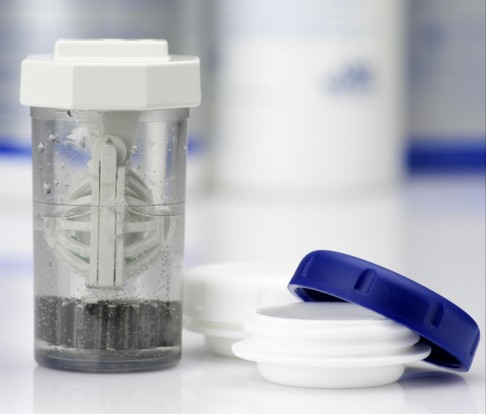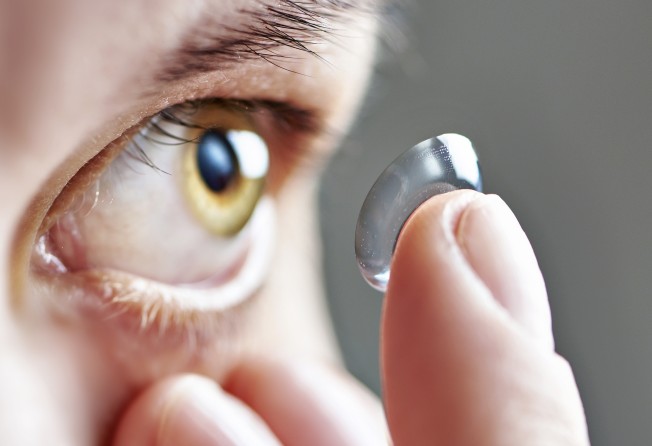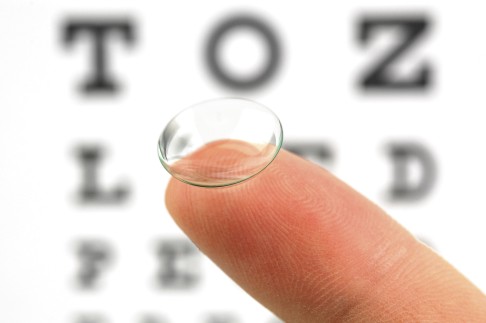
Nine common mistakes that contact lens wearers must avoid
Poor contact lens hygiene can cause infections that could lead to blindness - here are nine things to avoid

Fact: contact lens wearers are more prone to eye infections than non-lens wearers. According to the Centre for Health Protection, wearing contact lenses increases the risk of microbial keratitis, whereby the cornea gets infected, potentially leading to permanent visual impairment or blindness.
The centre estimates the incidence of microbial keratitis to range from 0.4 to 20 per 10,000 contact lens wearers per year. Those who wear the lenses overnight and for prolonged periods increase their risk of catching the disease from five to 10 times.
Using genetic tests to differentiate between thousands of bacteria, researchers at New York University's Langone Medical Centre suggest in a recent study that the root cause of the increased frequency of certain eye infections among lens wearers is the altered microorganism population in their eyes.
The researchers identified a diverse set of such microorganisms that more closely resembles the group of microorganisms of their eyelid skin than the bacterial grouping typically found in the eyes of non-wearers. This suggests that the organisms that cause eye infections in lens wearers emanate from the skin.

Greater attention should therefore be directed to eyelid and hand hygiene. Protect your vision by avoiding these nine common sins.
1. Not disinfecting lenses properly Lenses that are not thoroughly disinfected can cause irritation, infection and, occasionally, more serious eye problems that may lead to blindness.
Dr Ben Lam, a resident physician at Raffles Medical Hong Kong, says unless you wear daily disposable lenses, which are thrown away after each use, you should clean your pair each time you remove them, and again before they are reinserted.
Chemical solutions are the most common method of disinfection for contact lenses.
Always wash your hands thoroughly with soap and warm water before you proceed. Remove one lens and place it in the palm of your hand. Cupping your palm will enable you to clean the lens properly without losing it. Then, apply the daily cleansing solution to the lens and, using one finger, gently rub the lens. Next, rinse the lens clean using a sterile saline solution. Place the lens into its case and fill the receptacle with disinfectant solution. Repeat the process with the other lens.
Preferably, contact lenses should sit in their case overnight before being reused says Lam. Always rinse the disinfectant solution off with the sterile saline solution before placing the lenses back into your eyes.
2. Using tap water to clean lenses As tap water contains a number of microorganisms, this habit puts you at risk of developing Acanthamoeba infection. This is a potentially blinding condition, and one that is difficult to diagnose and treat. Lam advises not to swim or shower with contact lenses on because of the risk of contact with tap water.
3. Fitting lenses with wet fingers To prevent impurities and microorganisms from getting onto your lenses and then entering your eyes, make sure your hands are dry and clean when handling the lenses, says Rufina Chan Tin-yan, an optometrist at Family Eye Care in Wan Chai. "Clean your hands first using a moisturiser-free soap, rinse the soap off, and then dry your hands on a clean towel before touching the contact lenses."
Debris and bacteria on the lenses may also transfer onto your eyes while you are sleeping, and if these are not washed away, either by blinking or tears, they can cause a nasty eye infection
4. Wearing lenses for too long Doing so can cause the top layer of the eye, the cornea, to become swollen, dry and deoxygenated, which could lead to corneal scarring, visual blurring and irritation, and even a permanent loss of vision, says Lam. Follow your eye care expert's recommendations or stick to the instructions on the package.
5. Sleeping with contact lenses in During sleep, we do not have a normal blinking pattern or good tear circulation to keep our contact lenses moist. The lenses could dry out and stick on the corneas, making their removal difficult and painful. You might even damage your eyes when trying to remove them.
Debris and bacteria on the lenses may also transfer onto your eyes while you are sleeping, and if these are not washed away, either by blinking or tears, they can cause a nasty eye infection.
"Special extended-wear contact lenses do exist, which are made of a material that has been approved for overnight wear by the US Food and Drug Administration," says Chan. "Consult your optometrist to find out if these are suitable for you."

6. Not changing the contact lens case regularly Your case might look clean, but you cannot see the impurities and microorganisms on the surface. Chan's advice is to rinse the case with either hot tap water or multipurpose solution, and then air-dry and wipe it with a clean towel after every use. You may wish to place the case upside-down - with the caps off - on a clean tissue to help it dry faster. You should also change the case every three months. If you notice any cracks in the case, throw it away immediately.
7. Decanting your big bottle of solution into smaller bottles Many contact lens wearers do this when they travel. Chan advises against doing this because, firstly, the smaller bottles are not free from infectious microorganisms. Secondly, there is a high chance you will end up contaminating the entire solution in the process. Always buy travel-sized bottles of solution for trips.
8. Buying lenses from unlicensed eye-care retailers Regular or cosmetic contact lenses bought online or over the counter may not fit your eyes correctly, which is why you should always buy your pairs from a licensed optometrist.
Lam says wearing poorly fitted contact lenses can lead to hypoxia - or oxygen deprivation - in the cornea over time. The cornea does not have blood vessels and gets its oxygen from tears and directly from the atmosphere. Wrongly fitted lenses reduce the oxygen supply to the cornea, causing it to swell. Prolonged use of such lenses can lead to structural changes of the cornea and long-term vision complications.
"All contact lenses, both the regular and cosmetic varieties - should be purchased from a licensed optometrist that sources these products from reputable companies," Lam says. "The optometrist should also sell cleansing solutions manufactured by companies that are authorised by our local health monitoring agency. "
9. "Stretching" the wear of daily disposable lenses to save money They are called "daily" disposable lenses for a reason, says Chan. They are not made for continuous wear because they are made from a material that tears easily. You are definitely putting the health of your eyes at risk by extending the wear of your daily disposable lenses, so it makes sense to not try and cut corners.